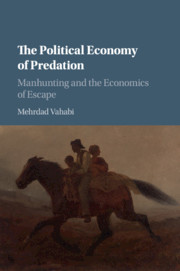Description
The Political Economy of Predation
Manhunting and the Economics of Escape
Author: Vahabi Mehrdad
This book analyses conflict theory through one type of conflict in particular: manhunting, or predation.
Language: English
Subject for The Political Economy of Predation:
The Political Economy of Predation
Publication date: 05-2019
Support: Print on demand
Publication date: 05-2019
Support: Print on demand
Approximative price 121.50 €
In Print (Delivery period: 14 days).
Add to cart
The Political Economy of Predation
Publication date: 12-2015
Support: Print on demand
Publication date: 12-2015
Support: Print on demand
Description
/li>Contents
/li>Biography
/li>
Still in the early stages of development, conflict theory presents a growing interest in understanding the economic costs and benefits of conflicts. In this book, Mehrdad Vahabi analyses one type of conflict in particular: manhunting, or predation, in which a dominant power hunts down its prey and the goal of the prey is to escape and thus survive. This contrasts with traditional warfare, in which two (or more) powers enter into a conflict and the goal is to fight to win domination. The economics of escape casts light on costs and benefits of predatory activities, and explores the impact of violence as an impediment to developing countries with respect to assets structure. This book is unprecedented in its research and thought, and develops a new theory of predation in economics that makes a significant contribution to the field.
1. Introduction; 2. The meaning of predation; 3. Domination, manhunting and conflictual costs and benefits; 4. Rational conflict theory, paradox of war and strategic manhunting; 5. Appropriation, violent enforcement and transaction costs; 6. Appropriation, the state space and the economics of escape; 7. Predatory nature of the state and democracy; Epilogue.
Mehrdad Vahabi is Associate Professor at the University of Paris VIII and associate member of Centre d'Economie de la Sorbonne (CES). His interests include political economy, economics of conflict, institutional economics, post-socialist transition and comparative economics. He is the author of The Political Economy of Destructive Power (2004) and has published in many peer journals including Public Choice, the Cambridge Journal of Economics, the American Journal of Economics and Sociology, Bulletin of Economic Research, Comparative Studies of South Asia, Africa, and the Middle East, the Canadian Journal of Development Studies, Louvain Economic Review and Revue d'économie politique.
© 2024 LAVOISIER S.A.S.
These books may interest you

The Ethology of Predation 105.49 €


